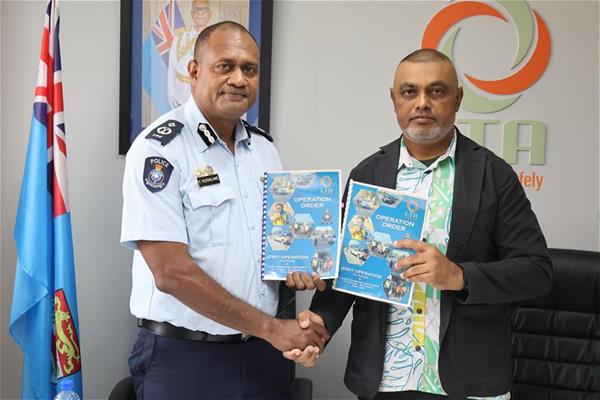SUVA, Fiji (24th September 2025): The Land Transport Authority (LTA) and the Fiji Police Force have officially launched the joint road safety operations for the 2025–2026 festive season, aimed at curbing speeding, reckless driving, and other dangerous road behaviours.
The road safety and enforcement operations, which will run from October 1, 2025 to January 31, 2026, were formally endorsed today at a signing ceremony in Valelevu, Nasinu, by Acting Assistant Commissioner of Police (A/ACP) Operations Kasiano Vusonilawe and LTA Chief Operating Officer Imran Ali.
Mr Ali said the initiative would combine enforcement, awareness, and community engagement to reduce accidents, fatalities, and traffic offences during what is traditionally one of the busiest and most high-risk periods on Fiji’s roads.
He said the festive season was marked by an increase in traffic volumes due to holiday travel, social gatherings, and end-of-year celebrations.
“This period also presents heightened risks, with drivers more likely to engage in behaviours such as speeding, overloading, careless and dangerous driving, and impaired driving as a result of drink-driving or fatigue,” Mr Ali shared.
“Every year we see lives lost on our roads due to poor decisions by drivers and operators who think they can avoid detection by exploiting differences in jurisdiction between the LTA and Police. This joint operation removes those gaps. Through this joint operation with Fiji Police, we will ensure that non-compliant road users face both regulatory and criminal consequences. Our goal is simple – to keep Fiji’s roads safe and protect lives,” Mr Ali said.
Mr Ali stressed that the partnership was designed to close existing enforcement gaps and send a strong message of deterrence.
A/ACP Vusonilawe echoed these sentiments, emphasising the shared responsibility of enforcement agencies and the community.
He said Fiji Police Force was fully committed to working side by side with the LTA to prevent unnecessary tragedies.
“Road safety is everyone’s responsibility, and we are appealing to drivers, passengers, and pedestrians alike to do their part,” he said.
The joint road safety campaign will focus on high-risk behaviours and areas identified through past enforcement data and traffic incident reports.
Specific measures will include traffic enforcement and speed monitoring to deter excessive speeding on highways and busy road corridors; overloading control for buses, minibuses, and trucks to ensure passenger and cargo safety; e-ticketing compliance checks to prevent revenue leakage and protect commuter rights; and road safety awareness campaigns in communities, schools, and transport hubs to encourage responsible road use.
Both the LTA and Fiji Police are urging the public to take ownership of road safety by adhering to traffic laws, exercising patience, and looking out for vulnerable road users such as pedestrians, children, and the elderly.
“No amount of enforcement will succeed without the cooperation of the public,” A/ACP Vusonilawe added.
“If you are driving, slow down. If you are drinking, do not drive. If you are a passenger, speak up when your driver is taking risks. Every action counts in saving lives.”
The joint road safety operation is not only about penalties but also about changing behaviour through awareness and education.
“Our overarching goal is clear – safer roads, zero fatalities, and a culture of responsibility that extends beyond the festive season,” Mr Ali added.
He said enforcement operations would also include overlapping patrols during peak hours to ensure constant coverage on busy routes as well as joint patrols at high-risk blackspot areas to maximise visibility and deterrence.

Acting Assistant Commissioner of Police (A/ACP) Operations Kasiano Vusonilawe, left, and LTA Chief Operating Officer Imran Ali formalise the joint road safety/enforcement operations for the festive period. Image: LTA